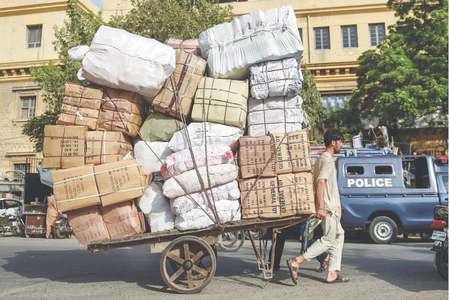Salima, a 60-year-old Christian widow, carefully pulls out a crumpled token from a worn-down zipped pouch. It’s nothing more than a small square of low-quality paper with a number scribbled on it, but she offers it hopefully. Working as a maid in two houses in Bath Island, Salima cannot make ends meet. Her rent alone comes to Rs9,000, substantially more than her humble monthly wages of Rs5,500.
With a valid CNIC, she has attempted to receive money from the Benazir Income Support Programme (BISP) several times but is turned back each time empty-handed. With limited prowess in the Urdu language, she is unable to understand why she cannot receive the cash. But she carries the coupon around as proof that she is eligible, trusting that someone will be able to help her eventually.
BISP is known as “Benazir kay paisay” among the poor, just as cash from the Ehsaas programme is known as “Imran Khan kay paisay”. A limited survey of 15 people localised in the Clifton/Bath Island area revealed the on-ground realities of implementation. Only two have been able to receive income support.
“It is based on qismet and naseeb,” opines a watchman when asked whether he has tried for Ehsaas. His wife has tried for BISP and was unable to receive funds so he has not tried for it. He has a vague idea of its criteria.
According to a PIDE policy note, BISP has not succeeded in reducing poverty among its recipients
Two more, a gardener and a sweeper/garbage collector, have never even heard of Ehsaas. The gardener writes it off as “money for women,” and refuses to hear more details. The sweeper, Arjun, is astonished that such a facility exists and is grateful for being informed about it.
Others have stories outlining their attempts, or lack thereof, in accessing the facility offered to the poor. One old lady laments being unable to receive cash through BISP because the machine is unable to read her thumbprint. Another is stuck in a remote village and is unsure how to retrieve it.
Among the impoverished women, even having a valid CNIC is considered an envious privilege. A maid, Saima, outlines that she was asked to bring all her close male relatives from the village when she went to the National Database & Registration Authority centre. “My father is bedridden, my brother works. I took my husband but they said it was not enough.” She believes, however, that greasing the palms of the official might get her the coveted CNIC but she does not have the money to spare. Without a valid identity card, she is unable to apply for BISP.
Saima’s husband had received funds Rs12,000 through Ehsaas from which she was gifted two sets of unstitched clothes (as a gift for giving birth to her son) but did not see a penny otherwise. Another garbage collector Naseem was able to receive the funds through Ehsaas but he too views it as luck.
With only a vague idea about the criteria of BISP and Ehsaas and limited awareness, to many, it seems income support programmes are like a lottery ticket that the government bestows on the fortunate few.
The 2021-22 budget increased the Ehsaas programme’s allocation to Rs260 billion. Furthermore, Rs200bn has been allocated for cash transfers to dailywage workers and employees under the Corona Stimulus Package.
“The major focus of the government is to execute the Ehasaas programme in its true spirit in 14 different categories for low-income people — including widows, orphans, poor, unemployed, needy students and special citizens in society,” said Special Assistant to the Prime Minister Dr Sania Nishtar while addressing a Senate session this month.
“Nutrition is embedded in the Ehsaas strategy post-Covid. The pandemic has shown that it is possible to place nutrition at the heart of poverty alleviation objectives,” she said at an international conference last week.
Be that as it may, for even those who receive the cash transfers, the benefit is limited to barely being able to keep their head above the water.
Last year, the Pakistan Institute of Development Economics wrote a policy viewpoint “Unconditional Cash Transfer and Poverty Alleviation in Pakistan”. The document stated that despite the 12 years of its intervention, BISP has not succeeded in reducing poverty among its recipients.
Its beneficiaries continue to struggle in maintaining basic needs and can make no progress on allocating more money to non-food items such as health and education.
The World Bank has recognised the Ehsaas Emergency Cash Programme as amongst the top four social protection interventions in the world in terms of the numbers of people covered. However, the independent verification of the actual help provided by those at the bottom of the pyramid remains suspect.
To the government’s credit, several measures are being taken to improve its delivery. For example, a survey was carried out and is 95 per cent complete that improves the data available on beneficiaries and can thus target the deserving better. One-window operations are starting through which poor families will not have to go to multiple offices to seek help from the Ehsaas programme. The Ehsaas team did not respond after repeated requests for comments.
Published in Dawn, The Business and Finance Weekly, July 5th, 2021














































